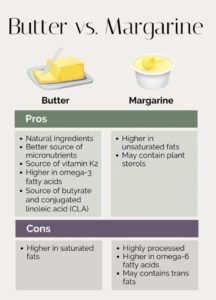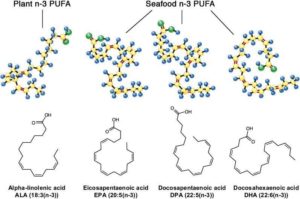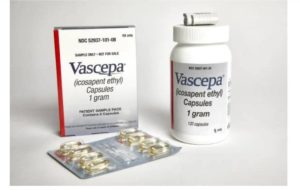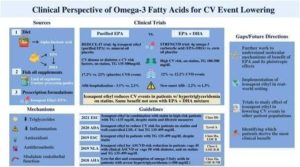Types of Fat
Saturated Fat
This is generally from animals, such as butter and lard. Red meat has streaks of saturated fat.
Mono-Unsaturated Fats
These are seen as healthy these days; think extra virgin olive oils.
Polyunsaturated Fatty Acids (PUFA)
These are in our diet and have fallen out of favour.
Think margarine—it was “better than butter” in the 1980s and 1990s. They are now seen as generally “bad.” But are there good ones? The main types are Omega-3 and Omega-6.
EPA and IPE—Omega-3 Fatty Acids: What Are They and What Do They Do?
Types of Omega-3 PUFA
- ALA: Alpha-linoleic acid, 18-carbon chain—from plants such as flaxseeds, chia seeds, flax oil, soybeans, and rapeseed oil. The body can’t make ALA.
- EPA: Eicosapentaenoic acid, 20-carbon chain—found in cold-water fatty fish, such as salmon, and fish oil supplements. The body can make small amounts. This may be important in immunity. EPA may reduce the risk of cardiovascular disease by lowering triglycerides, stabilising membranes, and reducing inflammation, clotting, and rhythm disturbances.
- DHA: Docosahexaenoic acid, 22-carbon chain—the body can make small amounts. This one is important for brain function. Herring and anchovy are high in this. Salmon has less of both EPA and DHA.
- DPA: Docopentanoic acid.
Diagram of molecular structure of these PUFA
What Is IPE (Icosapent Ethyl – Vazkepa)?
It is a combination of fish oils in a tablet that may reduce the risk of heart attack and stroke. It is a branded product with regulated dose content and is thus a medicine rather than a supplement. It is full of EPA and comes in a 1 g tablet.
It is used to lower triglycerides if they are high (>5.64 mmol per litre). High triglycerides can affect the pancreas gland and could lead to elevated cardiovascular risk.
Would I start taking these pills now?
It was used in the REDUCE-It trial. It showed some benefits. So probably, yes, if I had had a heart attack in the last 12 months, and I was already on:
- 2 anti-platelet blood thinning agents,
- A statin,
- An ACE inhibitor
- And my triglycerides were greater than 2.25 mmol/l
But you might get side effects. And the next big trial might refute the benefit. Statins have many trials all pointing at the same benefit. IPE has this one so far.
I would NOT as yet be recommending IPE it as primary prevention. I am in a statin myself as a preventative- not aspirin, and not IPE! YET.
If you have any questions about your cardiovascular health, contact us to book your first appointment today!
Should You Fix Your Diet Instead?
Can you get the same effect by changing your diet?
The statin story is all about lowering LDL. Most people can only affect this by about 10% with diet, while statins change it by 30%. This is why no diet intervention trial has conclusively proven mortality reduction.
The same may be true for the level of EPA (eicosapentaenoic acid) in the blood—raising it specifically may be beneficial and could be done with diet.
A large cohort study showed the highest intake of oily fish was associated with the lowest mortality. An estimated benefit from adding 200 mg EPA/DHA could reduce mortality by 7%. However, that does NOT prove it will happen.
Measuring EPA and DHA in blood is not routine. The average Omega index i.e., the percentage of these in red blood cells, was 6%. The higher the index, the lower the cardiovascular risk! Trying to get from 4% to 8% might take one portion of oily fish daily (1.5 g EPA/DHA). That MIGHT reduce risk by 30% but again, this is a cohort study and NOT prove that this will work. It is not a Randomised Trial
No single randomised trial of supplements has shown benefit previously, but a summary of all trials does show some reduction in cardiovascular risk. The dose of supplements varies greatly.
If you have any questions about your cardiovascular health, contact us to book your first appointment today!
So How Much is “Good Enough” in the Diet?
As a “medicine,” the REDUCE-IT trial used 4 g/day. As a supplement, perhaps 1 g of EPA/DHA may be sufficient in the long term—a daily portion of oily fish. A portion of salmon can give 1.25 g of EPA and 0.5 g of DHA.
Will this definitely reduce your cardiovascular risk? Well, it will do no harm, and it might help. We can’t be sure until a trial where people are randomly assigned to oily fish versus supplements.
While IPE shows promise in reducing cardiovascular risk, particularly for high-risk patients, dietary sources of Omega-3s remain an effective and natural way to maintain heart health. If you’re considering supplements, weigh the potential benefits against the risks and consult a medical professional for personalised advice.
Final Thoughts
I don’t really like supplements: eating Oily fish daily is a healthy option and does not harm if you can afford it!
I would not yet add IPA to a healthy person!
If you have had cardiovascular disease already then IPA may well give additional benefit to all standard treatment. My typical heart attack patient is on:
- Aspirin
- Ticagrelor
- Ramipril
- Atorvastatin
- Bisoprolol
And if the heart pump is significantly damaged :
- Dapaglifozin or Empaglifozin
- Spironolactone
- Entresto
- Ramipril
- Bisoprolol
I would probably now add IPA (Vazkepa) at a dose of 2g twice a day.
Article by Dr Malik, a leading UK cardiologist. He works at One Welbeck Heart Health – London’s Largest Private Cardiology Group, and at Hammersmith Hospital, Imperial College Healthcare NHS Trust, London, one of the largest NHS Trusts in the UK.






